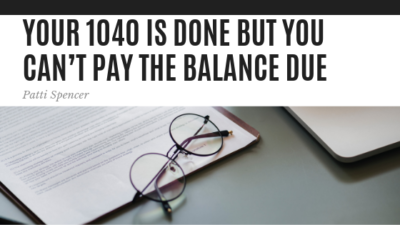Your 1040 is Done But You Can’t Pay the Balance Due

Can’t pay your income tax? Didn’t pay enough in estimates or had too little withholding? Can’t pay at all? Do you feel like you have to choose between the frying pan and the fire? You’re not alone, and there are ways to settle up with the IRS.
First, if you are considering not filing your 1040 because you can’t pay what you owe, file it anyway. There are penalties for filing late and you can avoid those. Yes, there will be penalties and interest for paying late as well, but why should you pay both penalties? If you miss the April 15 filing deadline, file as soon as you can. Whether you can pay the balance or not, don’t be a non-filer. By filing the return you will avoid the criminal charges of non-filing. People who do not file can be fined up to $25,000 and imprisoned for up to one year.
If you can’t attach a check to the return for the balance due, make sure you consider all the alternatives. Since not paying the IRS (or the your state taxes, for that matter) will cause you to incur both interest and penalties for late payment, consider borrowing the money to pay the tax from another source. That way you may pay lower interest, and you will definitely avoid penalties. The IRS takes payments via credit card. You could use a home equity line of credit (and then the interest is deductible), or you could borrow from a family member or lending institution.
You may be able to get more time to pay. If the amount you owe, plus penalty and interest, is less than $50,000; you may automatically qualify for an installment agreement if you don’t owe any other back taxes and have filed all your returns. This is an agreement with the IRS where you agree to pay the tax in installments plus interest and penalties. You can file online using the Online Payment Agreement (OPA).
Not comfortable with the online process?
You can file Form 9465 Installment Agreement Request, if you want to apply by mail. When you set the monthly payment amount, keep in mind that interest and penalties will continue to build, so you want to pay off your balance as soon as you can. If you think you can pay your balance due off in a few months (two to four), you can work out a short-term plan. The advantage is that there is no fee and the interest and penalties can be lower.
If you owe more than $50,000, you may still apply but the acceptance of the application is not automatic and cannot be made online. You must complete Form 9465 and Form 433-F.
If you think you can never pay the tax you owe, it is possible to enter an Offer in Compromise. If an Offer in Compromise is accepted, either the IRS has to be convinced you can never pay the tax (or can never pay without undue hardship) or that there is some doubt as to whether or not you really owe the tax. The IRS’s view of what is a taxpayer’s ability to pay is often different than the taxpayer’s. An Offer in Compromise is made on Form 656. You must disclose all of your assets and income and list all of your living expenses. Obviously, you will not be allowed lavish living expenses. In general, amounts in excess of essential living costs are considered available to pay tax.
Some folks’ IRS problems may go way back. They may have fallen into the trap of not filing a tax return for years. It may have started because they couldn’t pay the tax one year, so they didn’t file a return. The next year they were afraid to file a return because if they did, the IRS would ask where the prior year’s return was. I have seen people caught in this circular fallacy for years. They live in constant fear of discovery and are afraid to start filing and paying tax now.
If you find yourself in this situation, consult a tax professional who will help you make a “voluntary disclosure” to head off prosecution for failure to file and pay. Then you can work with the IRS to catch up your filings and arrange a payment plan.
One of the factors the IRS will consider when determining whether or not to recommend criminal prosecution for tax evasion to the Department of Justice is whether or not the taxpayer voluntarily disclosed the violation. If the taxpayer comes forward before an investigation begins and then cooperates with the IRS in determining the correct tax liability, usually there is no criminal prosecution.
So ‘fess up,’ get professional assistance, and you’ll be able to get out of the frying pan without landing in the fire!
